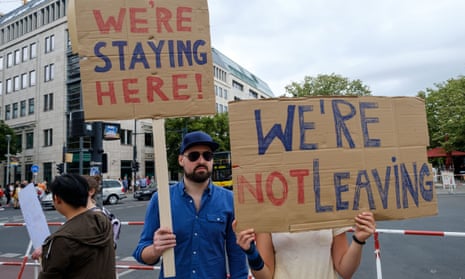Jeremy Corbyn has condemned Theresa May’s “Hunger Games approach to Brexit” after a document obtained by the Guardian warned that British nationals living on the continent could expect a backlash as a consequence of the government’s treatment of foreigners since the EU referendum.
The leaked EU assessment of the legal impact of Britain’s withdrawal says the 1.2 million Britons living in the EU could pay a penalty for the prime minister’s failure to offer a secure future for EU nationals in the UK.
The internal document drawn up by the European parliament’s legal affairs committee says it will be down to each member state to decide whether British citizens are allowed to carry on living within their respective borders after 2019, but adds: “The fact that it appears to be particularly difficult for foreign nationals, even if married to UK nationals or born in the UK, to acquire permanent residence status or British nationality may colour member states’ approach to this matter.”
Corbyn said the document pointed to “the human cost of a Tory-style Brexit. Families, jobs and homes are all in the balance.” He added: “There must be an end to this Hunger Games approach to Brexit negotiations, which gives no consideration to EU nationals in our country or British nationals living abroad.”
The Labour leader called on the government to make a commitment that EU nationals currently living in the UK would be free to continue to do so, saying the failure to do so amounted to “playing political games with people’s lives”.
As yet the British government has refused to make such a commitment. As a result there has been almost a 50% increase in the number of EU citizens applying for permanent residency documentation since the vote on 23 June. The number of applications rose from 36,555 in the three months to June 2016 to 56,024 in the three months to September, according to the latest figures.
EU nationals say that to obtain permanent residency cards they have to complete an 85-page form requiring huge files of documentation, including P60s for five years, historical utility bills and a diary of all the occasions they have left the country since settling in the UK. Some have received letters inviting them to prepare to leave the country after failing to tick a box on a form.
A cross-party group of the European parliament has established a taskforce to investigate the complaints, and a parliamentary hearing is expected to be announced in the coming days, to which a UK minister will be asked to give evidence.

The Liberal Democrat leader, Tim Farron, said May had been caught “playing with fire”. He said: “This issue could have been settled from the start if the government had done the right thing and made clear EU citizens who have made the UK their home can remain indefinitely.
“Instead, millions of people on both sides of the channel are being left in limbo and faced with agonising uncertainty over their futures. Antagonising our European partners is no way to get a good deal for Britain and for the many UK citizens living in EU countries.”
David Lammy, the Labour MP and former minister, who voted against Brexit, said the refusal to guarantee EU citizens’ rights “has significantly reduced our international standing and made it far less likely that the EU will feel inclined to give us a good deal”.
He went on: “At a time when the leader of the free world is putting refugee bans in place and threatening to deport people, our government needed to show courage and leadership. Failing to do so … not only let down the 3 million EU citizens who call our country home, it also looks like it will affect British expats living in Europe too.”
Caroline Lucas, a co-leader of the Green party, said any further delay in giving EU nationals a guaranteed right to stay would be “unforgivable”.
“It’s deeply worrying that British nationals living abroad face being on the receiving end of a backlash against our government,” she said. “The simple fact is that Theresa May should have already given an unequivocal guarantee to EU nationals living here in Britain – giving them certainty of their right to remain.”
Sophie in ‘t Veld, a Dutch MEP who is leading a European parliament taskforce investigating the residency issue, said the UK government had acted “immorally” in failing to offer security to those who had made Britain their home.
“We are receiving so many emails every day from people in the UK and elsewhere worried about the future that we cannot answer them individually,” she said. “This is immoral. And if this leaked document is right, then it has backfired.”The document was drawn up by the European parliament’s committee on legal affairs this month to help shape the negotiating positions of the parliament and the EU’s Brexit negotiators for the coming article 50 talks.
The committee claims that while “specific entitlements acquired validly in the past” – such as a pension or ownership of a property – may continue to apply, “it cannot … be considered that a person who is no longer an EU citizen will have unrestricted rights to live, work and study in the EU, or benefit from social security arrangements such as reciprocal healthcare entitlements, unless specific provisions are made.”
The committee also says it will be “difficult if not impossible” to arrange a transitional deal within the next two years to cushion the UK in its withdrawal from the EU. May has said she wishes to leave the single market and the customs union but have a transitional arrangement in place with the EU after 2019, in advance of what she hopes will be a free trade agreement. The prime minister aims to avoid a “cliff edge”, whereby British companies lose all access to the single market and face tariffs on their exports overnight.
In a foreword to the report, Pavel Svoboda, a Czech MEP who chairs the legal affairs committee, writes: “One important preliminary question affecting all policy areas is the extent to which transitional arrangements could be envisaged legally.
“It would seem to us that such arrangements could only be adopted by international agreement or a protocol to the treaties, which would require the unanimous agreement of the member states and ratification in accordance with their national constitutional tradition. It would seem difficult, if not impossible, to reach such an agreement before the end of the period provided for in article 50.”
The committee also reports that while it is hoped that the challenges can be overcome, there will be an impact on the careers of British staff working within European institutions: “The European parliament, the council and the commission alone have more than 1,500 British staff members. The UK withdrawing from the European Union will definitely have an impact on their careers for, in principle, only nationals of a member state can work for the EU institutions.”
It adds that without a negotiated solution the current staff “could be subject to compulsory resignation”.
Laura Shields, a spokesperson for Brits Abroad Yes to Europe, which campaigned to get UK citizens living in the EU to vote in the referendum, said: “Contrary to popular cliches, most Brits living on the continent aren’t wealthy pensioners who’ve retired to the riviera to live it up in the sun.
“Our recent research shows that Brits in the EU worry about the same things as the rest of the British population – they have jobs, families that need supporting and carer responsibilities. But losing their EU citizenship will cause a myriad of practical problems which must be addressed fully in the negotiations if they are to get a fair deal and to be able to stay in the country they call home.”
A Home Office spokesperson said: “This government has been clear that we want to protect the status of EU nationals already living here and the only circumstances in which that wouldn’t be possible is if British citizens’ rights in European member states were not protected in return.
“The prime minister has reiterated the need for an agreement as soon as possible as part of the negotiations to leave the EU. The rights of EU nationals living in the UK remain unchanged while we are a member of the European Union. EU nationals do not require any additional documents to prove their status.”











Comments (…)
Sign in or create your Guardian account to join the discussion